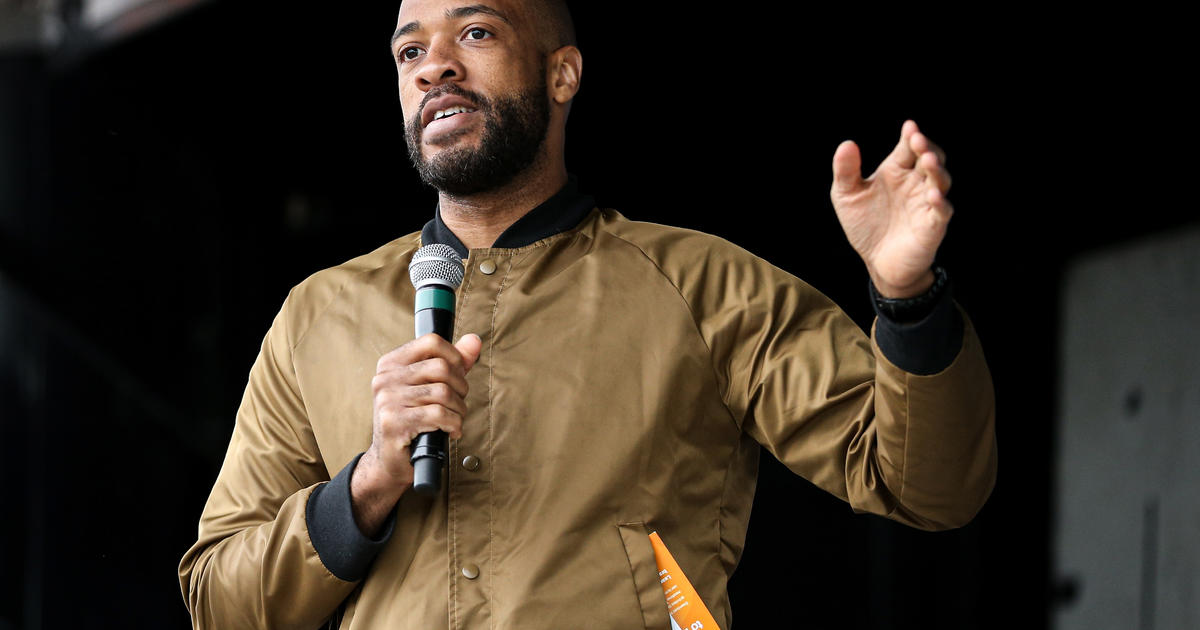Wisconsin Lieutenant Governor Mandela Barnes is jumping into a crowded Senate primary to be the Democratic nominee in 2022. His entrance heightens what is expected to be one of the marquee primaries during the midterm elections.
Barnes joins seven other Democrats who have already launched their Senate bids. They’re lining up to potentially face incumbent Republican Senator Ron Johnson, who has not yet announced if he will seek a third term.
“The U.S. Senate is broken,” Barnes said Tuesday at a rally in Milwaukee. “Senator Ron Johnosn is not delivering for the people of Wisconsin. He’s doing like so many other cynical politicians who use false choices to divide us for their own political gain.”
“Hard-working families deserve every opportunity, but politicians like Senator Ron Johnson aren’t delivering,” Barnes tweeted on Tuesday.
FILE: MILWAUKEE, WISCONSIN – JUNE 19: Wisconsin Lieutenant Governor Mandela Barnes speaks to the crowd during the 48th Annual Juneteenth Day Festival on June 19, 2019 in Milwaukee, Wisconsin.
Photo by Dylan Buell/Getty Images for VIBE
Barnes is the first Black lieutenant governor elected in Wisconsin and only the second Black statewide elected official. Barnes easily won his 2018 primary for lieutenant governor before he and Governor Tony Evers narrowly defeated former Republican Governor Scott Walker in the general election. Barnes also served two terms in the State Assembly from 2013 to 2017.
His announcement video focused on his family’s working-class roots and said Wisconsin families need more opportunities. Barnes has been endorsed by the liberal Progressive Change Campaign Committee.
At his campaign kickoff rally, Barnes said America can’t go back to the same policies of the pre-pandemic days. He said leaders need to tackle the climate crisis, end gun violence and create more equal economic opportunities.
“I believe that we need to build a better America so that the opportunity I was able to find isn’t so rare,” Barnes said. “I’ve taken on inequality and I’ve fought for equal opportunity. I can guarantee you that’s the fight that I’ll continue in the United States Senate.”
“The system isn’t working. You see so many people who are working longer hours and harder, oftentimes for much less,” Barnes said in his announcement video. “Let’s be unabashedly unafraid to work together to change the game.”
Wisconsin will be one of the premiere battlegrounds during the midterm elections, with competitive races for governor and Senate. President Biden won Wisconsin by a razor-thin 20,000 votes last November, and Evers defeated Walker in 2018 by about 30,000 votes. Cook Political Report rates Wisconsin’s Senate race as a tossup.
The Democratic field has already attracted top-tier candidates. Milwaukee Bucks executive Alex Lasry, who launched his campaign in February, has already raised $2 million and has $1 million cash on hand. Wisconsin State Treasurer Sarah Godlewski, who jumped into the race in April, is backed by EMILY’s List and raised more than $500,000 last quarter. Outagamie County Executive Tom Nelson, who launched his campaign late last year, raised $240,000 last quarter and has $406,000 in the bank.
Other candidates who have entered the race in recent months include Wisconsin State Senator Chris Larson, radiologist Gillian Battino, business consultant Adam Murphy and attorney Peter Peckarsky. Steven Olikara, the founder and former CEO of Millennial Action Project, announced in May that he was forming an exploratory committee for a potential Senate bid.
Barnes’ entry into the race comes about a month after he told the Milwaukee Journal Sentinel that he received his college diploma in May 2020 from Alabama A&M University. Barnes finished attending classes at the school in 2008 and said during his 2018 campaign that he received a degree from there, though he had not yet fulfilled all of the requirements to receive it.
“While Wisconsin Democrats trip over themselves to prove who’s more liberal, Senator Ron Johnson continues to work hard to bring common sense to Washington and fight for the people of Wisconsin,” Lizzie Litlow, a spokeswoman for the National Republican Senatorial Committee, said in a statement.
Although Johnson hasn’t said if he’ll seek another term, he raised more money than his potential Democratic challengers last quarter, bringing in nearly $1.1 million. He has $1.7 million in the bank.
At a Milwaukee Press Club event last month, Johnson said he wasn’t feeling pressure to make a decision soon and noted that he didn’t jump into his race in 2010 until seven months before the election. Johnson added that his main goal is to keep the seat Republican.
“I’m going to do nothing to hamper our ability as the Republican Party to retain this U.S. Senate seat,” Johnson said. Former President Trump encouraged Johnson to run in April when he endorsed the incumbent senator. NRSC chair Rick Scott told the conservative “Ruthless” podcast that he bothers Johnson “every day” about running again.
Barnes’ decision to run for U.S. Senate means there will likely be an open competition to join Evers on the Democratic ticket in November 2022. Evers announced last month that he was going to run for re-election. Wisconsin holds primary elections for lieutenant governor and the candidate who wins that race is placed on the ballot with the party’s gubernatorial nominee.
In December, Evers told the Milwaukee Journal Sentinel, “I’d prefer (Barnes) to be lieutenant governor” but pledged to respect whatever political decision Barnes made. He thanked Barnes for his work, but did not offer an endorsement on Tuesday.
“Mandela Barnes is a good friend and has been a great partner working to address challenges facing our state, and I’ve always said I would support any decision Mandela made about how best to serve the people of Wisconsin,” Evers said in a statement. “We’re lucky to have strong Democratic candidates who are running to send him packing, and I look forward to supporting Wisconsin Democrats’ choice to take on Ron Johnson in 2022.”
